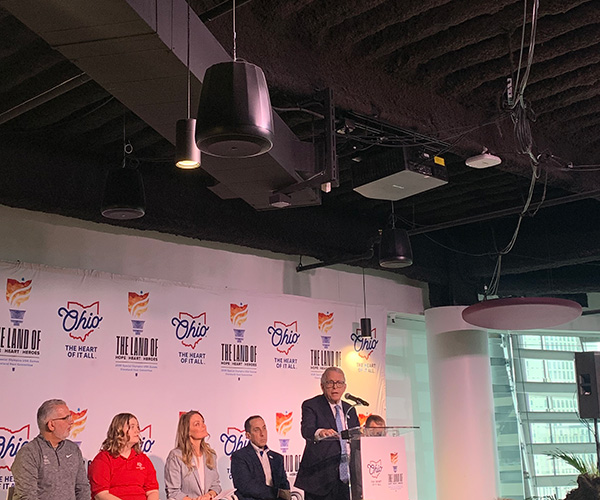Jim Thorpe stands on a pedestal in the middle of the Pro Football Hall of Fame's First Century of Pro Football exhibit. Thorpe holds a ball with his right arm, his left arm by his side. His legs are bent, one higher than the other and angled. He is frozen in a running form, cutting up the field, avoiding defenders. His eyes look toward the end zone.
It's hard to think of a more worthy centerpiece: Thorpe played professional football until he was 40 years old and spent a number of years playing in Canton.
"Professional football had a negative reputation," says Jason Aikens, collections curator at the Hall of Fame. In those days, he says, pro football was associated with gambling and unsavory characters, while college football was seen as altruistic, a way of helping young men achieve rugged individualism.
"[Thorpe] was the first big college star to come in, and he brought great notoriety," Aikens says. "He really put pro football on the map and is part of the reason why the Hall of Fame is here in Canton."
Thorpe first came to Canton in 1915, when the Bulldogs signed him for $250 a game in an effort to beat Massillon. While Thorpe didn't play much in the first game, he dominated the second, taking over as coach, playing the entire game and kicking two field goals for the game's only points.
Five years later, he was made president of the newly formed American Professional Football Association, which would later become the National Football League.
In June, Thorpe's presence in the Hall of Fame became more significant. A renovation moved the main entrance and created the First Century of Pro Football exhibit, housing tokens such as a ribbon and program from a Canton-Massillon game and uniforms from the league's beginnings. A 30-foot-long wall lists every professional team in NFL history (look for the forgotten clubs such as the Columbus Panhandles and Portsmouth Spartans) along with their records.
Thorpe, who had been on a smaller pedestal on the Hall of Fame's first floor, was placed on a 4-foot stand in the middle of the exhibit, allowing him to tower over the game he helped establish.
Past Play
| 1920 Akron Pros championship fob Before there were Super Bowel rings, pro football players were given gold fobs shaped like a mini football when they won the league championship. |
Marion Motley's first contract Motley signed iwth the Cleveland Browns in 1946 for a grand sum of $4,000, making the Browns the first pro team to voluntarily integrate |
Football. circa 1890 One of the oldest known footballs was unearthed in an Akron attic during a renovation. Luis Millin found the ball and donated it to the Hall of Fame. |

.jpg?sfvrsn=d67cfd8c_1&w=640&auto=compress%2cformat)

